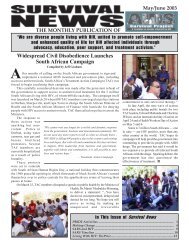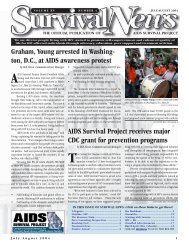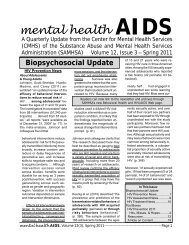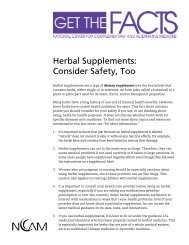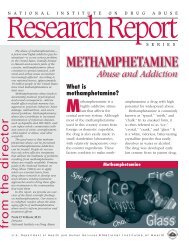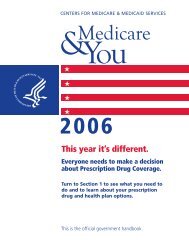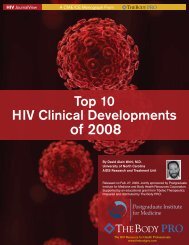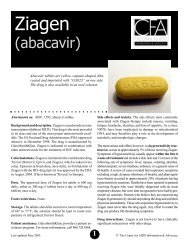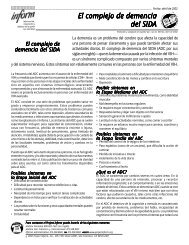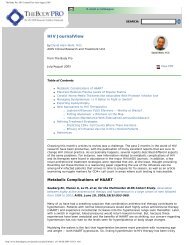here - CD8 T cells - The Body
here - CD8 T cells - The Body
here - CD8 T cells - The Body
You also want an ePaper? Increase the reach of your titles
YUMPU automatically turns print PDFs into web optimized ePapers that Google loves.
PHOTO: © iAS/RyAn RAyBuRn-COMMERCiAliMAgE.nET<br />
protease inhibitor levels,<br />
with greater potential for coformulation,”<br />
said presenter<br />
Joel Gallant, MD, MPH of<br />
Johns Hopkins University<br />
School of Medicine. He noted<br />
the various co-formulations<br />
of cobicistat with protease<br />
inhibitors that are in development.<br />
Moreover, he pointed<br />
out that, “[Norvir]-boosted<br />
Reyataz is known to be a<br />
lipid-friendly regimen and<br />
cobicistat is no different.”<br />
“This is all good news,”<br />
said session co-facilitator<br />
Christine Katlama, MD, of<br />
Hospitalier Pitie-Salpetriere in<br />
Paris, “because all the drugs<br />
work and when they don’t<br />
work t<strong>here</strong> is no resistance.”<br />
Risky business<br />
for sex workers<br />
Several sessions looked at<br />
abuses that put sex workers<br />
at risk for HIV—and we’re not<br />
talking sex.<br />
Instead, it’s police actions<br />
around the world—including<br />
<strong>here</strong> in the United States—to<br />
confiscate condoms and<br />
to use them as evidence<br />
of prostitution that puts<br />
sex workers at risk for HIV.<br />
Advocates<br />
said the situation is<br />
such that many sex<br />
workers are afraid<br />
to carry condoms<br />
because of the police<br />
harassment this can<br />
cause. In fact, even<br />
outreach workers<br />
have been followed<br />
by the police so that<br />
sex workers can be<br />
arrested when they<br />
take the condoms<br />
offered. As advocates<br />
pointed out, it is<br />
not illegal to carry<br />
condoms. Rather,<br />
confiscation serves as another<br />
avenue of illegal detention<br />
and intimidation.<br />
Moreover, criminalization<br />
of consensual sex work keeps<br />
workers under dangerous conditions.<br />
In the “Criminalizing<br />
Condoms and Sex Work”<br />
session, Acasia Shields, author<br />
of Criminalizing Condoms, a<br />
report from the Open Society<br />
Foundation, said, “Police<br />
routinely search sex workers<br />
to confiscate and destroy condoms.<br />
This affects their ability<br />
to practice safe sex and they<br />
know it.”<br />
Of the U.S. sex workers<br />
surveyed, 52% said they<br />
were afraid to carry condoms<br />
because of fear of police<br />
harassment. Shields said<br />
other abuses include<br />
threats of arrest to<br />
exhort sex,<br />
and beating<br />
or raping sex<br />
workers.<br />
Discussing<br />
the findings<br />
from the first<br />
national congress<br />
of sex workers in<br />
Bangladesh, Simon<br />
mY BOdY, mY BuSInESS: Discussing sex workers’ issues.<br />
Risen, MD, MPH, PhD, of Save<br />
the Children, said, “Violence<br />
against female sex workers<br />
spreads far beyond individual<br />
incidents and factually is gender-based<br />
violence.” Among<br />
other recommendations, Save<br />
the Children in Bangladesh<br />
says behavioral change campaigns<br />
should be aimed at<br />
changing community perceptions<br />
and creating acceptance<br />
of sex workers in mainstream<br />
society, and that maternal and<br />
child services should focus<br />
more on issues related to sex<br />
workers.<br />
Darby Hickey of the Los<br />
Angeles chapter of SWOP<br />
(Sex Workers Outreach<br />
Project), said, “We think<br />
sometimes that countries like<br />
the United States are a world<br />
apart from countries like<br />
Bangladesh, but unfortunately,<br />
we face the same issues.<br />
It is about law and about<br />
policy change, but also about<br />
how police operate outside<br />
the range of law. So we need<br />
to change policies, holding<br />
police accountable, and<br />
address the wider societal<br />
indifference and downright<br />
hostility.” She said efforts to<br />
“rescue and save” sex workers<br />
should be called “arrest<br />
and abuse.”<br />
In the session titled “<strong>The</strong><br />
Oldest Profession: Is Sex<br />
Work Work?,” Naomi Akers<br />
said equating sex work with<br />
human trafficking is insulting<br />
and hurts both sex workers,<br />
who are targeted by raids,<br />
and victims of trafficking,<br />
who aren’t helped at all.<br />
“When you’re doing sex work,<br />
of course you see it as work.<br />
It buys you food and helps<br />
you take care of your family,”<br />
she said, calling trafficking<br />
“horrible.”<br />
Deanna Kerrigan of the<br />
Johns Hopkins Bloomberg<br />
School of Public Health in<br />
Baltimore detailed findings<br />
of higher HIV risk among sex<br />
workers around the world, and<br />
said support for sex workers’<br />
groups, as well as human and<br />
health rights is critical for all<br />
sex workers, including men<br />
and transgender people.<br />
Labor rights, the focus of the<br />
session, would help to eliminate<br />
stigma and discrimination<br />
and increase HIV prevention<br />
efforts for this group of workers,<br />
she said. Richard Howard<br />
POSiTivElyAwARE.COM SEPTEMBER+OCTOBER 2012 37





